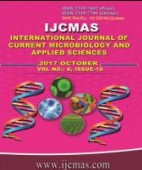


 National Academy of Agricultural Sciences (NAAS)
National Academy of Agricultural Sciences (NAAS)

|
PRINT ISSN : 2319-7692
Online ISSN : 2319-7706 Issues : 12 per year Publisher : Excellent Publishers Email : editorijcmas@gmail.com / submit@ijcmas.com Editor-in-chief: Dr.M.Prakash Index Copernicus ICV 2018: 95.39 NAAS RATING 2020: 5.38 |
The bioactive properties of cooked and uncooked pulp of Solanum lycopersicum (tomato) were studied. Both cooked tomato pulp (CTP) and uncooked tomato pulp (UTP) had high total phenolic and flavanoid content and antioxidant activity was ascertained by various in-vitro assays. Gram positive organisms were sensitive to CTP and UTP but the extracts were ineffective against Gram negative bacteria. Composite food packaging films were prepared by blending Polyvinyl Alcohol (PVA) and Gelatin and functional properties of the films were improved by the addition of these pulps. The mechanical properties, radical scavenging activity and anti-microbial activity of the films were studied. Tensile strength, puncture strength and percentage elongation of the films decreased on addition of TP. PVA-Gelatin films incorporated with TP were effective against S. aureus and B. cereus. Incorporation of TP into the PVA-Gelatin films made the films bioactive as they showed both antioxidant and antimicrobial activity. The shelf life of chicken meat packed in the above films was extended during chilled storage. Chicken packed in these films had lowered oxidative rancidity and microbial counts. Hence, tomato pulp can be used effectively to prepare active films and thus improve the safety and shelf life of meat and meat products.
 |
 |
 |
 |
 |